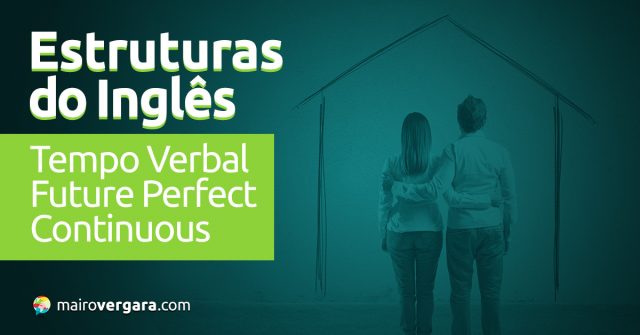Parece que foi ontem que começamos a falar sobre os tempos verbais! Mas já tivemos posts sobre todos os tempos verbais do presente e do passado, e chegou a hora do último post em relação ao futuro: o Future Perfect Continuous. Sabe como ele é formado e quando usá-lo?
Falemos primeiro da estrutura deste tempo verbal. Para formar uma frase no Future Perfect Continuous, siga esta ordem:
Sujeito + will have been + verbo com -ing
Se você leu nosso post sobre o Future Perfect, deve ter percebido que will have been nada mais é do que o Future Perfect do verbo be. A diferença é que o Future Perfect Continuous, assim como o Present Continuous e o Past Continuous, usa o verbo com terminação -ing (present participle). Lembrando que tais verbos terminados em -ing correspondem ao nosso gerúndio, ou seja, às terminações -ando, -endo e -indo (amando, correndo e rindo, por exemplo).
Mas chega de teoria e vamos à prática. Veja uma frase no Future Perfect Continuous:
You will have been waiting for more than two hours when her plane finally arrives.
Você estará esperando por mais de duas horas quando o avião dela finalmente chegar.
Agora que você entendeu como formar frases no Future Perfect Continuous, talvez esteja se perguntando quando devemos usá-lo. Bem, este tempo verbal pode ser usado basicamente em duas situações:
1 – Para falar de uma ação que continuará ocorrendo no futuro por uma certa duração de tempo ou até que outra ação a interrompa. Veja isso nos exemplos abaixo:
They will have been talking for over an hour by the time Thomas arrives.
Eles estarão conversando por mais de uma hora quando o Thomas chegar.
James will have been teaching at the university for more than a year by the time he leaves for Asia.
O James estará ensinando na universidade por mais de um ano quando ele for embora para a Ásia.
He will have been working at that company for three years when it finally closes.
Ele estará trabalhando naquela empresa por três anos quando ela finalmente fechar.
We will have been driving for over three straight days when we get there.
Nós estaremos dirigindo por mais de três dias direto quando nós chegarmos lá.
In November, I will have been working at my company for three years.
Em novembro, eu estarei trabalhando na minha empresa por três anos.
At five o’clock, I will have been waiting for thirty minutes.
Às cinco horas, eu estarei esperando por trinta minutos.
When I turn thirty, I will have been playing piano for twenty-one years.
Quando eu completar trinta anos, eu estarei tocando piano por vinte e um anos.
2 – Podemos também usar este tempo verbal para falar da “relação causa e efeito” entre duas ações, ou seja, a ação A acontecerá por causa da ação B. Veja exemplos:
They will be exhausted because they will have been studying non-stop for five hours.
Eles estarão exaustos porque eles terão estudado sem parar por cinco horas.
(Leia o post Como se diz O Tempo Todo em inglês?)
Jason will be tired when he gets home because he will have been jogging for over an hour.
O Jason estará cansado quando ele chegar em casa porque ele terá corrido por mais de uma hora.
Claudia’s English will be perfect when she returns to Germany because she will have been studying English in the United States for over two years.
O inglês da Claudia estará perfeito quando ela voltar para a Alemanha porque ela terá estudado inglês nos Estados Unidos por mais de dois anos.
Para formar frases negativas, basta acrescentar o NOT após o will, como de costume:
I will not have been living here that long when I go back to college.
Eu não estarei morando aqui por tanto tempo assim quando eu voltar para a faculdade.
(Leia o post Qual a diferença entre University e College?)
The famous artist will not have been painting the mural for over six months by the time it is finished.
O artista famoso não estará pintando o mural por mais de seis meses quando ele estiver pronto.
They will not have been using this car since March.
Eles não estarão usando este carro desde março.
I will not have been waiting for you for that long.
Eu não estarei esperando por você por tanto tempo assim.
E para formar perguntas, coloque o will antes do sujeito:
Will you have been feeling better when you finish this diet?
Você estará se sentindo melhor quando terminar essa dieta?
Will the teacher have been teaching the kids since early in the morning?
A professora estará ensinando as crianças desde de manhã cedo?
How long will you have been studying when you graduate?
Por quanto tempo você estará estudando quando você se formar?
When you finish your English course, will you have been living in New Zealand for over a year?
Quando você terminar seu curso de inglês, você estará morando na Nova Zelândia por mais de um ano?
Vale a pena mencionar que, no Future Perfect Continuous, o modal verb will pode ser substituído pelo verbo to be + going to, como nos exemplos abaixo:
Next month, the head teacher is going to have been teaching at the school for 20 years.
Mês que vem, o diretor estará ensinando na escola por 20 anos.
In September, she is going to have been living in France for a year.
Em setembro, ela estará morando na França por um ano.
I am going to have been studying English for three years by the end of this course.
Eu estarei estudando inglês por três anos ao fim deste curso.
We’re late. I think they are going to have been waiting for us. We’d better go.
Nós estamos atrasados. Eu acho que eles estarão esperando por nós. É melhor nós irmos.
Esta foi a nossa explicação sobre o Future Perfect Continuous. Caso tenha ficado com alguma dúvida, fique à vontade para deixar seu comentário. Acrescente ao seu Anki algumas frases com este tempo verbal e se você acha que os posts de estrutura acabaram, se engana! Ainda tem muita coisa interessante vindo por aí, então fique ligado! See you next time!

BAIXE O MATERIAL DO POST


















